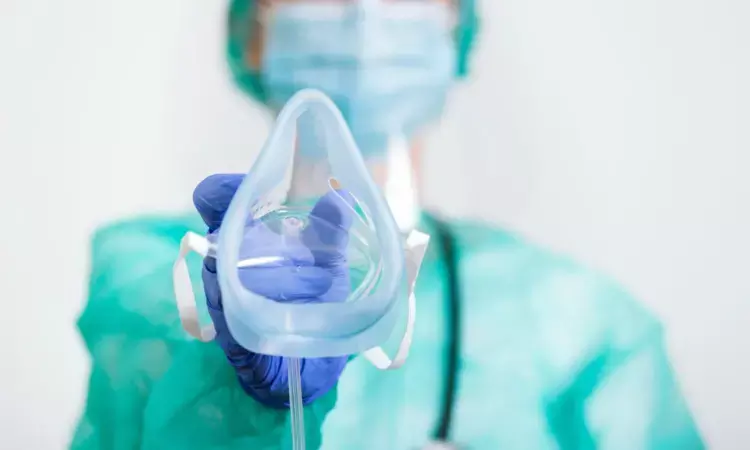- Home
- Medical news & Guidelines
- Anesthesiology
- Cardiology and CTVS
- Critical Care
- Dentistry
- Dermatology
- Diabetes and Endocrinology
- ENT
- Gastroenterology
- Medicine
- Nephrology
- Neurology
- Obstretics-Gynaecology
- Oncology
- Ophthalmology
- Orthopaedics
- Pediatrics-Neonatology
- Psychiatry
- Pulmonology
- Radiology
- Surgery
- Urology
- Laboratory Medicine
- Diet
- Nursing
- Paramedical
- Physiotherapy
- Health news
- Fact Check
- Bone Health Fact Check
- Brain Health Fact Check
- Cancer Related Fact Check
- Child Care Fact Check
- Dental and oral health fact check
- Diabetes and metabolic health fact check
- Diet and Nutrition Fact Check
- Eye and ENT Care Fact Check
- Fitness fact check
- Gut health fact check
- Heart health fact check
- Kidney health fact check
- Medical education fact check
- Men's health fact check
- Respiratory fact check
- Skin and hair care fact check
- Vaccine and Immunization fact check
- Women's health fact check
- AYUSH
- State News
- Andaman and Nicobar Islands
- Andhra Pradesh
- Arunachal Pradesh
- Assam
- Bihar
- Chandigarh
- Chattisgarh
- Dadra and Nagar Haveli
- Daman and Diu
- Delhi
- Goa
- Gujarat
- Haryana
- Himachal Pradesh
- Jammu & Kashmir
- Jharkhand
- Karnataka
- Kerala
- Ladakh
- Lakshadweep
- Madhya Pradesh
- Maharashtra
- Manipur
- Meghalaya
- Mizoram
- Nagaland
- Odisha
- Puducherry
- Punjab
- Rajasthan
- Sikkim
- Tamil Nadu
- Telangana
- Tripura
- Uttar Pradesh
- Uttrakhand
- West Bengal
- Medical Education
- Industry
Proton pump inhibitors might increase risk of respiratory infections in cystic fibrosis patients

Since prolonged proton pump inhibitors (PPI) medication may raise the chance of respiratory infection by P. aeruginosa (Pa), it should be used with caution in people with cystic fibrosis (pwCF), says an article published in Digestive and Liver Diseases.
In order to treat gastro-esophageal reflux disease in patients with a variety of comorbidities, such as chronic respiratory diseases like asthma, chronic obstructive pulmonary disease, pulmonary arterial hypertension, and idiopathic pulmonary fibrosis, proton pump inhibitors (PPIs), a class of antacid medications, are available by prescription and over-the-counter. Limited research has been done on the efficacy of proton pump inhibitors as adjuvant therapy to treat maldigestion in cystic fibrosis patients, and worry over potential adverse effects is growing. The purpose of this study, which was carried out by Laura Zazzeron and colleagues, was to evaluate the effectiveness of proton pump inhibitors in cystic fibrosis patients.
A matched cohort study using pediatric and adult people with cystic fibrosis who took PPI for around three months was carried out by researchers. Utilizing a nearest neighbor propensity score matching based on sex, year of birth, CFTR genotype, and pancreatic insufficiency, treated patients were matched to a group of patients who never received PPI.
The key findings of this study were:
1. 160 pwCF were included in the trial, 80 of them received treatment and 80 did not.
2. No discernible differences in the changes in BMI z-score across groups were seen over a median follow-up of 2 years (adjusted mean difference: 0.06, 95% CI: -0.17-0.30).
3. At the beginning, P. aeruginosa was detected in the cultures of 25.5% (n = 20) of the treated patients and 22.5% (n = 18) of the untreated patients.
4. In the treated group, the proportion of Pa positive cultures rose to 47.5% (n = 38) at the follow-up visit, whereas it dropped to 26.3% (n = 21) in the untreated group (adjusted mean difference: 23.1%, 95% CI: 10.8-35.3).
Reference:
Zazzeron, L., Alicandro, G., Daccò, V., Lanfranchi, C., Bulfamante, A., Sciarrabba, C. S., Corti, F., & Colombo, C. (2022). Effects of prolonged proton pump inhibitor treatment on nutritional status and respiratory infection risk in cystic fibrosis: A matched cohort study. In Digestive and Liver Disease. Elsevier BV. https://doi.org/10.1016/j.dld.2022.09.005
Neuroscience Masters graduate
Jacinthlyn Sylvia, a Neuroscience Master's graduate from Chennai has worked extensively in deciphering the neurobiology of cognition and motor control in aging. She also has spread-out exposure to Neurosurgery from her Bachelor’s. She is currently involved in active Neuro-Oncology research. She is an upcoming neuroscientist with a fiery passion for writing. Her news cover at Medical Dialogues feature recent discoveries and updates from the healthcare and biomedical research fields. She can be reached at editorial@medicaldialogues.in
Dr Kamal Kant Kohli-MBBS, DTCD- a chest specialist with more than 30 years of practice and a flair for writing clinical articles, Dr Kamal Kant Kohli joined Medical Dialogues as a Chief Editor of Medical News. Besides writing articles, as an editor, he proofreads and verifies all the medical content published on Medical Dialogues including those coming from journals, studies,medical conferences,guidelines etc. Email: drkohli@medicaldialogues.in. Contact no. 011-43720751


